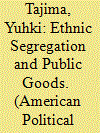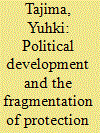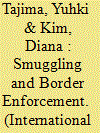|
|
|
Sort Order |
|
|
|
Items / Page
|
|
|
|
|
|
|
| Srl | Item |
| 1 |
ID:
160561


|
|
|
|
|
| Summary/Abstract |
This article contributes to the study of ethnic diversity and public goods provision by assessing the role of the spatial distribution of ethnic groups. Through a new theory that we call spatial interdependence, we argue that the segregation of ethnic groups can reduce or even neutralize the “diversity penalty” in public goods provision that results from ethnic fractionalization. This is because local segregation allows communities to use disparities in the level of public goods compared with other communities as leverage when advocating for more public goods for themselves, thereby ratcheting up the level of public goods across communities. We test this prediction on highly disaggregated data from Indonesia and find strong support that, controlling for ethnic fractionalization, segregated communities have higher levels of public goods. This has an important and underexplored implication: decentralization disadvantages integrated communities vis-à-vis their more segregated counterparts.
|
|
|
|
|
|
|
|
|
|
|
|
|
|
|
|
| 2 |
ID:
084039


|
|
|
|
|
| Publication |
2008.
|
| Summary/Abstract |
Recent scholarship on communal violence in Indonesia since the late New Order has focused on identifying causal mechanisms of particular subtypes of communal violence such as large-scale communal violence, town-level communal rioting, intervillage violence, and lynching. While such analyses are useful in understanding aspects specific to each subtype of violence, analyzing each subtype separately risks the analytical problem of selection on the dependent variable if there are important similarities across subtypes. Drawing on the observation that each of these subtypes appeared to rise and fall together since the late New Order, I propose a common factor that can explain the broad temporal patterns of communal violence. In particular, I point to increasing restraints on the military that arose from intraregime infighting, greater scrutiny of military actions during the keterbukaan (political openness) period, and the withdrawal of the military from police duties during Reformasi. I examine four cases of communal conflict: (1) a case in which intravillage violence was averted, (2) a case of lynching, (3) a case of lynching and subsequent intervillage reprisals, and (4) a case of large-scale communal violence. The first three cases are from Lampung province, and the fourth is the case of Poso district, Central Sulawesi.
|
|
|
|
|
|
|
|
|
|
|
|
|
|
|
|
| 3 |
ID:
159864


|
|
|
|
|
| Summary/Abstract |
Why do gangs proliferate during democratization and decline in number during authoritarian consolidation? I utilize primary evidence of two Indonesian gangs to inform a model of protection gangs under varying states of political development. Modeling gangs as territorial firms under different regulatory conditions, I attribute their number and political affiliation to the interaction between state capacity and political fragmentation. In weak states, gangs will lack political affiliations and their number will be determined by the scalability of their coercive capacities. In countries where states have the capacity to significantly constrain gangs, but lack significant costs for politicians to associate with them, gangs will seek political affiliation, trading coercive services for lax law enforcement. In such contexts, their number will be determined by state factionalization. Thus, gangs proliferate during democratization due to more political actors sharing state control. I assess the theory examining Indonesia’s history of statebuilding and political transition.
|
|
|
|
|
|
|
|
|
|
|
|
|
|
|
|
| 4 |
ID:
188387


|
|
|
|
|
| Summary/Abstract |
This article analyzes the efficacy of border enforcement against smuggling. We argue that walls, fences, patrols, and other efforts to secure porous borders can reduce smuggling, but only in the absence of collusion between smugglers and state agents at official border crossings. When such corruption occurs, border enforcement merely diverts smuggling flows without reducing their overall volume. We also identify the conditions under which corruption occurs and characterize border enforcement as a sorting mechanism that allows high-skilled smugglers to forge alternative border-crossing routes while deterring low-skilled smugglers or driving them to bribe local border agents. Combining a formal model and an archival case study of opium smuggling in Southeast Asia, we demonstrate that border enforcement has conditional effects on the routes and volumes of smuggling, depending on the nature of interactions between smugglers and border agents. By drawing attention to the technological and organizational aspects of smuggling, this article brings scholarship on criminal governance into the study of international relations, and contributes to debates on the effects of border enforcement and border politics more generally.
|
|
|
|
|
|
|
|
|
|
|
|
|
|
|
|
|
|
|
|
|